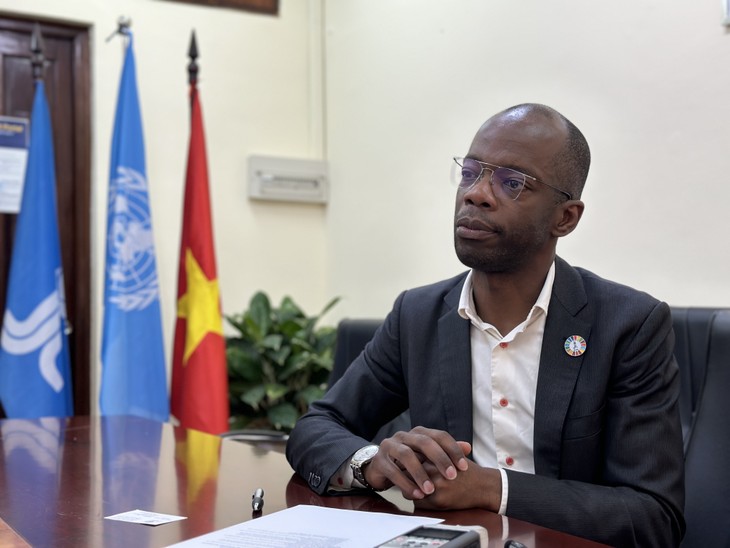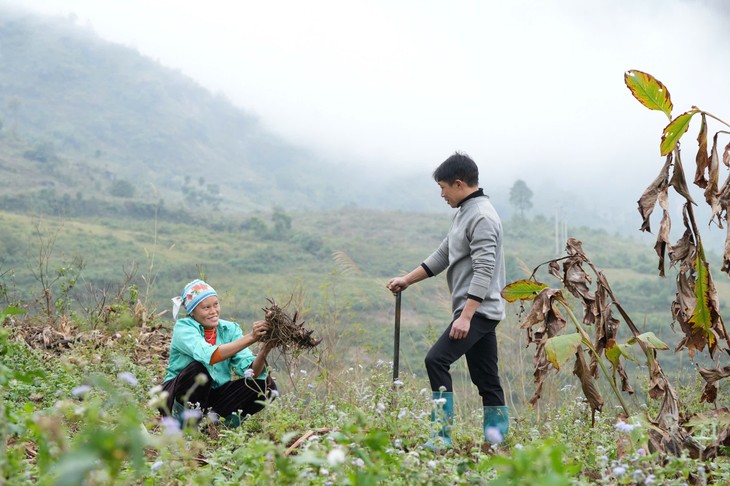(VOVWORLD) - As Vietnam transitions to being a middle-income country, it faces reduced access to preferential financing. Innovative financial solutions, including one from the International Fund for Agricultural Development (IFAD), have become essential. IFAD’s grants and loans support smallholder farmers and promote sustainable agricultural practices. VOV talked to Ambrosio N. Barros, IFAD’s Country Director in Vietnam, about the “Reduced Emissions through Climate-Smart Agroforestry” project whose funding was finalized by IFAD and the Vietnamese Government last month.
 Ambrosio Barros, IFAD’s Country Director in Vietnam (Photo credit: Pham Hoang) Ambrosio Barros, IFAD’s Country Director in Vietnam (Photo credit: Pham Hoang)
|
Bao Tram: Thank you, Mr Barros, for granting VOV24/7 this interview. Tell us something about IFAD's work in Vietnam over the past 30 years.
Ambrosio Barros: Thank you so much for giving me the opportunity to present what IFAD has been doing in Vietnam. In the last 30 years, the IFAD has focused on four main areas. First is support for smallholder farmers. We have helped millions of smallholder farmers improve their productivity and resilience. Our 16 projects in Vietnam have raised more than 788 million USD to finance projects that have improved the lives of 735,000 families. We’ve also promoted value chains, which has enabled farmers to connect with markets and obtain fair prices, and rural financing initiatives, which has improved access to credit, allowing households to invest in sustainable practices. Finally, we’ve contributed to policy reforms by collaborating with government agencies on reforms that support rural development.
Bao Tram: IFAD and the Vietnamese Government last month finalized the funding for RECAF, a project on emission reduction in the Central Highlands and South-Central Coast. What motivated IFAD to launch the project?
Ambrosio Barros: The RECAF project responds to several important needs: The first is the urgency of addressing the impact of climate variability on agriculture in some of the most vulnerable provinces in Vietnam, the Central Highlands. The second is empowering rural communities to adapt and strive in these changing conditions. The third is ensuring that Vietnam remains aligned with the 2030 agenda through its commitment to sustainable practices, to reduced emissions, and to enhanced resilience. That way we make sure Vietnam addresses the Sustainable Development Goals.
Bao Tram: How will the RECAF project contribute to achieving the Sustainable Development Goals in Vietnam?
Ambrosio Barros: This project is hoping to contribute to several SDGs, but let me focus on three of them. The first is ‘no poverty’. RECAF plans to improve agricultural activities to lift communities out of poverty. The second is ‘zero hunger’. This project will ensure food security through sustainable practices. The third SDG is ‘climate action’. The idea is to contribute to environmental sustainability and climate change activism. We’ll do that by promoting inclusivity and sustainability through community engagement and empowerment.
 IFAD's Commercial Smallholder Support Project helps Bac Kan province reduce poverty sustainably. (Photo credit: IFAD) IFAD's Commercial Smallholder Support Project helps Bac Kan province reduce poverty sustainably. (Photo credit: IFAD)
|
Bao Tram: How many people will benefit from the RECAF project?
Ambrosio Barros: The target will be about 100,000 small households, and we’ll focus on ethnic minorities, women, and youth. We believe they are the most vulnerable populations here in Vietnam. What we hope to achieve is to increase agricultural property and food security for those populations. We hope we can improve their livelihoods and resilience to climate change and promote better forest management and biodiversity conservation. The RECAF project is set to officially launch in June 2025, representing a significant step towards resilient rural development in Vietnam.
Bao Tram: Looking ahead, how do you envision IFAD's role in Vietnam in the next decade?
Ambrosio Barros: The way I see IFAD’s future in Vietnam is in five steps:
First, I hope IFAD will remain a leading partner for the government in driving Vietnam’s agricultural transformation. Second, I hope we’ll continue to scale up successful models by expanding climate-smart agriculture initiatives. The third area where I see we still have a role is collaborating with the private sector. We hope to be able to continue leveraging investments from the private sector for sustainable development. The fourth area would be strengthening partnerships. I believe financial collaboration with local governments and communities will allow us to create sustainable relationships with the private sector, with central and local authorities, and with communities. The last area I think will be important is ensuring a comprehensive approach. This means focusing on gender equity, youth engagement, and environmental systems to ensure that the impact of these activities lasts in Vietnam
Bao Tram: You said IFAD wants to collaborate with the private sector. What is IFAD’s plan to help this sector?
Ambrosio Barros: Very good question! IFAD historically gives its financing to the government and all IFAD financing focuses on rural areas. Lately we’ve been changing our approach, because we believe sustainable development also depends on the private sector and on micro and small enterprises. So now we’re developing instruments to work more closely with the private sector.
There are two main instruments. There’s what we call ‘non-sovereign operations’. That means we don’t go through the government. We could, maybe, provide direct support to SMEs, to micro and small enterprises. Or we could do it within a typical project, but more through blended finance. What we call ‘blended finance’ is basically coming up with what we call ‘public-private partnerships’ where the smallholders are also part of the game, part of the equation. But, also, the private sector could, for instance, benefit from IFAD’s support to encourage them to go where they usually don't go. As you know, small enterprises are not usually risk takers. They don't want to go into the forest areas in a developing country. With IFAD’s support, they would go where they usually don't go, and the idea is that they start to invest where they usually don't invest. This’s the role IFAD wants to play.
Bao Tram: Thank you, Mr. Ambrosio Barros, IFAD Country Director, for spending this time with VOV24/7.
Ambrosio Barros: You’re welcome! I’m glad to talk with you and hope to work with you again in the future.